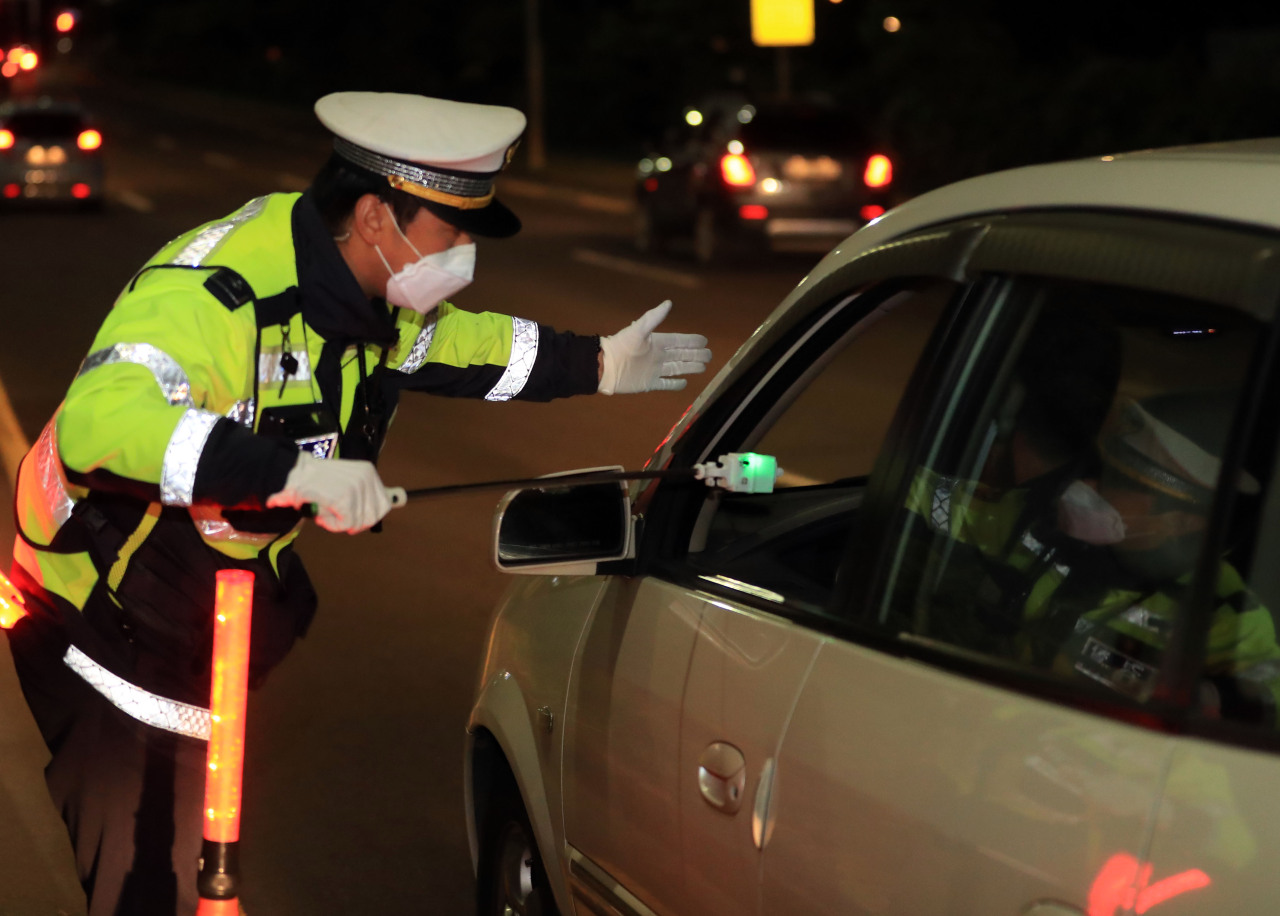S. Korea police adapt to COVID-19 era, introduce non-contact DUI testing

A Jeju policeman uses a non-contact DUI testing device at a check point in Jeju on May 20. (Yonhap)
SEOUL — Life is getting back to some semblance of normality in South Korea, with people out and about on the streets and in parks, students returning to school in stages, and public transportation crammed during rush hours.
Also getting back into gear is the police’s war against drunk driving.
Police, who in the past months could only sparingly test drivers’ breath for alcohol due to virus fears, are now employing a new tool — non-contact DUI testing equipment that does not require drivers to directly blow into breathalyzers, a practice at high risk for spreading the novel coronavirus.
At first glance, the new device resembles a selfie stick. A sensor that detects airborne alcohol content is attached at the end of a 60-centimeter-long stick, which is placed some 30 centimeters in front of drivers’ face for about five seconds through the window.
The device makes beeping sounds when alcohol is detected.
Article continues after this advertisementThis method allows drivers to undergo testing without having to completely open their car windows and avoid coming into close contact with police officers.
Article continues after this advertisement“Officers at the Gwangju Police Station in Gyeonggi Province came up with the idea and designed the new non-contact DUI testing devices as an alternative to breathalyzers,” Kim Ju-gon, chief of the traffic safety section at the Korean National Police Agency, told The Korea Herald last week.
“In terms of accuracy, we have adjusted the sensitivity level of sensors after the test run and implemented a three-step procedure at DUI checkpoints,” Kim said.
In late January, when coronavirus fears started to grip the nation, police suspended random drunk driving tests using breathalyzers. Instead, it shifted to selective testing of suspected vehicles.
The change prompted a sharp increase in the number of drunk driving accidents. The tally between January and March came in at 4,101, up 24.4 percent on-year, according to the National Police Agency.
A total 79 people were killed in drunk driving accidents, 6.8 percent higher from the same period last year, it added.
To put the brakes on the rise, non-contact DUI testing devices were introduced nationwide last week after test runs in some parts of Gyeonggi Province for about a month.
During the trial period the accuracy of the devices came into question when they reacted to drivers who had used products containing alcohol, such as hand sanitizers.
Kim said it was inevitable for sensors to react to alcohol-based products such as hand sanitizers and windshield washer fluid.
To make up for this shortcoming, a three-step DUI testing procedure was rolled out.
The process begins by using non-contact devices. If alcohol is detected, drivers are instructed to proceed to the second step, where they have to blow into detectors that tell whether they have consumed alcohol. These detectors do not measure blood alcohol levels.
The police said detectors are immediately placed in individual bags after single use.
The final step tests drivers’ blood alcohol level using a breathalyzer.
“I had to wait longer than usual for non-contact DUI testing. But given the coronavirus situation, this seems to be the optimal choice to ensure road safety,” 43-year-old driver Lim Woo-ri said.
The non-contact testing devices, however, still suffer from a loophole.
Given that sensors measure alcohol inside vehicles, there remains a possibility they could miss drunk-drivers if drivers fully ventilate their cars, leading water droplets to evaporate before drivers reach checkpoints.
According to Kim, drivers are directed to keep their windows closed 10 meters prior to checkpoints.
Until a vaccine is rolled out that can put an end to the deadly disease, the police plan to keep non-contact DUI testing in place, Kim said.
For more news about the novel coronavirus click here.
What you need to know about Coronavirus.
For more information on COVID-19, call the DOH Hotline: (02) 86517800 local 1149/1150.
The Inquirer Foundation supports our healthcare frontliners and is still accepting cash donations to be deposited at Banco de Oro (BDO) current account #007960018860 or donate through PayMaya using this link.